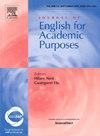Human-AI collaborative reading in academic contexts: An exploratory case study
IF 3.4
1区 文学
Q1 EDUCATION & EDUCATIONAL RESEARCH
引用次数: 0
Abstract
The increasing prevalence of generative artificial intelligence (GenAI) in education presents new opportunities and challenges for second language (L2) learners' academic literacy development. While tools like ChatGPT can act as virtual experts, offering immediate feedback and engaging learners in reflective dialogues, little is known about how L2 readers interact with them in their academic practices and how their reading processes evolve. Taking a sociocognitive view, grounded in sociocultural theory and interpreted through the heuristic lens of the Direct and Inferential Mediation (DIME) model of reading comprehension, this exploratory case study examined how one international graduate student engages with GenAI to enhance academic reading. Data were collected over six weeks through screen-recordings of reading sessions, chat logs, stimulated recall interviews, and semi-structured interviews. Findings revealed that ChatGPT functioned as a translator, knowledge facilitator, and strategic partner, reducing reading anxiety while supporting comprehension across key components of the DIME model, such as vocabulary knowledge, background knowledge, inference-making, and reading strategies. Notably, the learner demonstrated a shift in reading approach, moving from an initial dependence on translation toward more strategic engagement with academic texts, including the use of summarization and inference. However, perceived AI limitations, such as questionable reliability and excessively detailed responses, occasionally caused fatigue for the learner. By providing an in-depth exploration of human-AI interaction in academic reading, the study contributes to the growing body of literature on GenAI's role in L2 education, laying the groundwork for future studies on its long-term impact on L2 reading.
学术语境下的人类-人工智能协同阅读:一个探索性案例研究
生成式人工智能(GenAI)在教育领域的日益普及为第二语言学习者的学术素养发展带来了新的机遇和挑战。虽然像ChatGPT这样的工具可以充当虚拟专家,提供即时反馈并让学习者参与反思对话,但人们对二语读者在学术实践中如何与它们互动以及他们的阅读过程如何演变知之甚少。本探索性案例研究以社会认知观点为基础,以社会文化理论为基础,通过阅读理解的直接和推理调解(DIME)模型的启发式视角进行解释,研究了一名国际研究生如何使用GenAI来提高学术阅读。在六周的时间里,研究人员通过屏幕录音收集了阅读会话、聊天记录、刺激回忆访谈和半结构化访谈的数据。研究结果显示,ChatGPT作为翻译、知识促进者和战略合作伙伴,减少了阅读焦虑,同时支持理解DIME模型的关键组成部分,如词汇知识、背景知识、推理制定和阅读策略。值得注意的是,学习者在阅读方法上发生了转变,从最初的依赖翻译转向更多地与学术文本进行战略性接触,包括使用摘要和推理。然而,人工智能的局限性,如可靠性问题和过于详细的反应,偶尔会让学习者感到疲劳。通过对学术阅读中人类与人工智能互动的深入探索,本研究为越来越多关于GenAI在第二语言教育中的作用的文献做出了贡献,为进一步研究其对第二语言阅读的长期影响奠定了基础。
本文章由计算机程序翻译,如有差异,请以英文原文为准。
求助全文
约1分钟内获得全文
求助全文
来源期刊

Journal of English for Academic Purposes
Multiple-
CiteScore
6.60
自引率
13.30%
发文量
81
审稿时长
57 days
期刊介绍:
The Journal of English for Academic Purposes provides a forum for the dissemination of information and views which enables practitioners of and researchers in EAP to keep current with developments in their field and to contribute to its continued updating. JEAP publishes articles, book reviews, conference reports, and academic exchanges in the linguistic, sociolinguistic and psycholinguistic description of English as it occurs in the contexts of academic study and scholarly exchange itself.
 求助内容:
求助内容: 应助结果提醒方式:
应助结果提醒方式:


